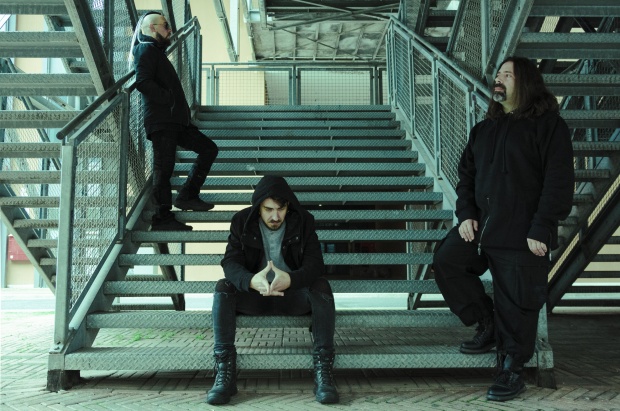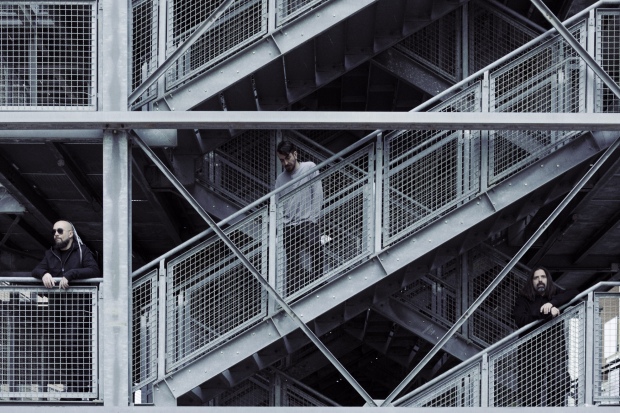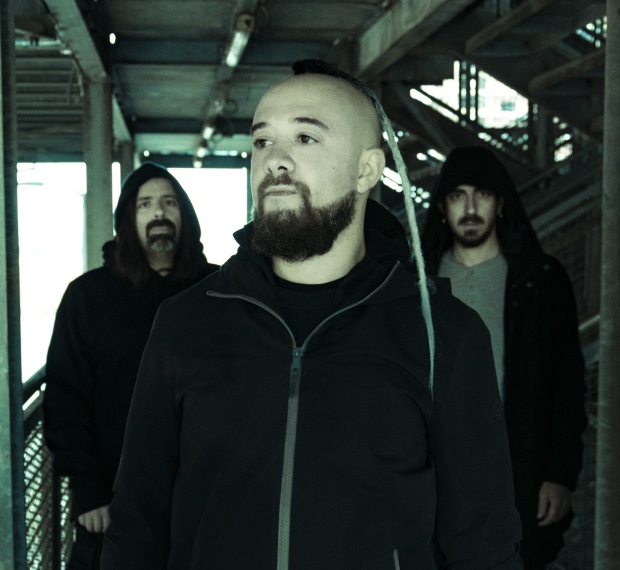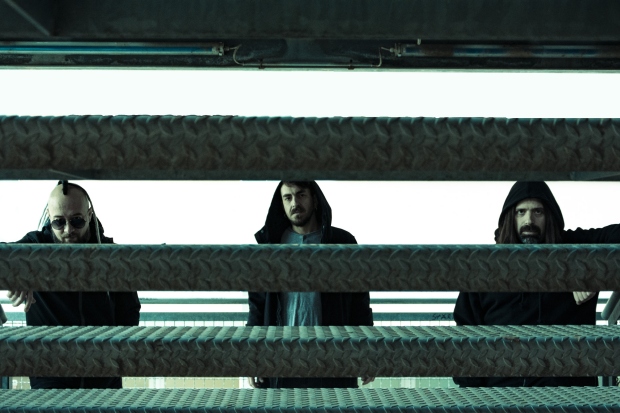A few weeks ago we published Nick Hudson’s review of Aborym and their Hostile album, “a schizophrenic, kaleidoscopic, ever-changing barrage of hostility occasionally wrapped up in a more melodic skin, but never something that feels fully safe”. We now present Nick’s interview with Fabrizio Giannese (‘Fab’) from the band…
Hi Fab, thanks for agreeing to this. I thought I’d start by looking back to the three albums released in between Hostile and SHIFTING.negative. For me, they seem to have paved the way for the direction you’ve taken with Hostile. Although your Bandcamp page calls these albums compilations of “unreleased studio recordings, remixes, live recordings, work-in-progress plus minutes of superior outtakes”, and suggests that “it’s unlikely that anybody outside of those dedicated fans will find this of interest”, there’s no doubting in my mind that Hostile may not have taken the shape is has without them. There’s a sense of cinematic drama and soundscape within those three albums that feels to me like it has been taken across into Hostile.
You are talking about the Something for Nobody trilogy… Well, it was a really exciting project more then real official ABORYM releases, and it helped a lot in order to calcify the band’s experimental DNA and the alchemy between us. I don’t like to have unreleased material. I think everything that comes out from the band and its musicians has to be “published” somehow, so I proposed to our French label manager to release on vinyl a whole series of ideas, outtakes, alternate version, etc. It also gave me the chance to meet and work with our producer Keith Hillebrandt, who did a remix of a song from the SHIFTING.negative album called For a Better Past (Deconstruction mix).
And then, of course, the soundtrack music.
Yes, I also decided to publish some of the music I scored for movies and short movies. I had written more than one hour of original music for director Raffaele Picchio’s latest project Sakrifice, produced by Director’s Cut, as one of the eight episodes of Sangue Misto, a short-movie series coordinated by Davide Scovazzo. Volume Two’s A side features Postmidnight, originally written for The 7th Night of Thelema: A Virtual Ritual, produced by Chinese Wide/Polyhedron VR Studio and directed by Gianluigi Perrone. And on Volume Three, I released part of the soundtrack I wrote for director Valerio Di Lorenzo’s Quid movie, which I’m really proud of, and which is in competition for the David di Donatello film award. The film stuff is just something that happened rather than by any design. I really enjoyed it and I hope I get to do more, but I don’t view it as a change in direction, more like an addition.
Do you need to see the film first, before writing?
The inspiration really comes from spending time with the directors, before the movie production starts. That’s something really important for me in order to enter the film mood in a correct way. I had to try and find a musical companion for the scenes and did the first chunk of writing leading into the start of the shoot. I delivered about an hour of original music of which 50 minutes ended up in Quid. I don’t know how other people do it but that initial writing was very important as it gave me a place to start from and a kind of road map to develop once the picture started coming in. There’s a certain consistency in terms of the mood, which is deliberate, and that allowed me to move between the different instrumentation. So, everything was very important when I started to write new music with ABORYM. In music, knowledge is essential. The more you know about instruments the more you can obtain good results.
That, I guess, brings me back to Hostile, which almost sounds to me like it’s the score of an imaginary film – so you’ve definitely obtained some very good results. I know it’s possibly a bit of a stretch, but Hostile actually reminds me quite a bit of the classic horror film soundtracks from Goblin. And there are definite moments within the album that would not sound at all out of place in a horror film.
That’s an interesting point of view and I think in a way Hostile hides some cinematic approaches, even if basically accidental. This “cinematic” aura probably comes by our new way to approach the songwriting process, especially when we start to write new music on the modular system instead of writing stuff on a guitar or on the piano. We were trying to make something that sounded exciting, so we did get into the whole modular world. That was also something new to me, but I started learning by watching my friend Luciano Lamanna, because he’s a great programmer on that thing. He has a whole wall of it. The goal was to feel a sound in our head, and to start patching away on my modular system and always come up with something good. What I was into was the fact that it was very ‘in the moment’ performance-based recording. Unlike midi instruments, I could never recall the sound, and that in itself made the approach different. I would record, and might work with the parts, but it was more about embracing the imperfections than trying to fix them. And that’s really exciting. So, that cinematic mood you’re talking about comes from accidental solutions, by patching stuff through envelopes, LFOs, sequencers.
It definitely gives the whole album a sense of mood and atmosphere, and that ‘in the moment’ comes across too. For me, it really shows the contrast between Hostile and SHIFTING.negative. That release was almost a pop album (in so much as industrial music can be pop), filled with hooks and catchy choruses. While Hostile is potentially more melodic, it is definitely darker, heavier and more intense. I think it’s easily the most interesting and progressive album you’ve made so far, and has far more layers to it. Is that down to the different way of writing it?
Hostile is the first album we wrote as a band, I’m not the only one behind its writing, and it’s the perfect alchemy between me and my bandmates. They are all talented musicians, besides being very close friends and multi-instrumentalists. What’s interesting about the Hostile song-writing process is that we gave no limits or safe areas to work in, in the sense we were creating a process by changing the emotional state of the music in a natural way. And everybody in the band was working hard in that process. So you can have a piece of music or a flow of music which one minute is kind of happy, in the next minute it’s sad, in the next minute it’s angry. So we created dynamics and different emotional states to take the listener on this musical rollercoaster or journey.
That cinematic quality…
Yes, sometimes I create music trying to act like a movie director. But there is no main character or leading actor in this album. Every instruments is functional in order to complete the others. I don’t like to repeat myself; I don’t like to go backwards. And so I like to move forwards and it is something different again. You know, of course it still sounds like ABORYM and it sound like one of our records, but it’s a definite step into something else, something new. The final results reflect a combo of a very strong team-working between us, especially when we started demoing and in the pre-production, and the presence of both our sound engineer Andrea Corvo and producer Keith Hillebrandt. They did a top-notch work. And the Hostile album is getting super-awesome reviews, it seems people are loving it. I was very curious about how people could digest the new record, how they would react to it. We are all very pleased about getting positive feedback, especially from our fanbase!
I have noticed that myself, and it makes me very happy, because (as I said in my review of Hostile), I can’t remember reading a single positive review about SHIFTING.negative – and that really surprised me at the time, as it was the first album I had heard from ABORYM, and I loved it. I guess a lot of the hostile reaction was down to what was at the time quite a drastic change in sound, losing the black metal sound of previous releases. You must have known it wouldn’t go down entirely favourably, but even so, how did you feel about the reaction to it?
Basically SHIFTING.negative gave us the chance to jump into something really transversal and very far from the band’s extreme metal roots. Extreme metalheads usually don’t contemplate experimentation. They need the style to be static and pre-packaged – and that’s one of the reasons we felt such a repulsion in continuing playing music which stays the same as many other bands do. SHIFTING.negative was essential for us, under this point of view – and for the very first time we worked with a real producer, Guido Elmi. He gave us instructions about how to change our skin, in a professional way, and still sound and be ABORYM. That album was mixed by Marc Urselli, three times Grammy winning sound engineer, who worked with U2, Elton John, Foo Fighters, Lou Reed and others. It’s definitely not for static-minded people… anyway I don’t care too much about reviews…
For sure, that professional production and mix worked for the album. SHIFTING.negative feels a little like a collection of banging tunes. Again, I guess, the pop element. And that’s why, although for some people Hostile might not be seen as such a drastic change in sound from SHIFTING.negative, I think that is quite a superficial way to look at it. For me, there’s a world of difference between the two albums, in terms of sound design, structure and mood. Hostile seems to tell a story that maintains tension and drama, and has you hanging on to hear what happens next. I can’t really overstate how much greater I feel Hostile is to SHIFTING.negative, and I’m a fan of that album.
Well, Hostile is an album created by the interaction of four talented multi-instrumentalists, especially in the song-writing process, and everything has been done through a completely instinctive way, starting from the idea to put the right dress to the lyrics I wrote and to the whole series of events and thoughts that reflects our life today. I’m the type of personality who tends to become consumed with whatever I’m doing, but there’s obviously a closeness that comes from the continued musical relationship. As I told you before, it’s a natural and instinctive process dictated by our DNA as musicians. We’re all influenced by our ideas, and when ideas come we get addicted by the need to make these ideas sound good. It’s always been a challenge and a musical adventure… every song is approached from a different place to best try and avoid falling into our musical comfort zones – it’s the opposite of ‘I recorded my first hit with this amp and I’ve used it on every record since’. It keeps things exciting in terms of the work and the history and friendship allows a healthy level of honesty – especially when we are in our studio. I think some of our best stuff has been done there. We’ve made music together for long enough now, two years more or less, and we are all so close that it becomes an intuitive experience. SHIFTING.negative sounds a little bit different and I think is a more pop-oriented record, even if full of different moods. I don’t want to say that we did a pop album, but what we did is certainly not associated with the classic forms of rock. All these classical pop elements have disappeared in the new album. That doesn’t exclude a sense of travel, a very ambitious narrative approach, very experimental, epic in a way. Our connection to pop music or progressive rock is not broken, we could come back to it, but I don’t find any interest in it at the moment. We want contemporary and fresh music that reflects the world we live in today.
I have no problem with pop, and perhaps that is why I enjoyed SHIFTING.negative – even if it’s not actually a pop album, per se. And perhaps it’s because the pop has definitely been put away for Hostile that the response for it seems far more positive, which is really nice to see. I didn’t read any reviews until I had submitted my own, and I have to admit I was wondering if I might be the outlier in giving such a positive review, but actually I’ve not seen any entirely negative reviews.
I think our audience has been slightly surprised and lots of people simply love the new record because it’s an integral part of our musical universe. For the umpteenth time we’ve changed our skin, like serpents do. I’ve always aspired to create that musical climate where the idea of genre is irrelevant and on Hostile I dare to believe that it is not possible to describe what we do in terms of genres. All you can say is that this is music by ABORYM. Our early role models were Einsturzende Neubauten, Skinny Puppy, Pink Floyd, and a whole series of electronic bands like Massive Attack, Neu!, Nine Inch Nails… the kind of artist you can’t describe through a genre. All you can say is that they make their music. I don’t compare ABORYM at all to these great artists, but from a philosophical point of view, that’s what we want to do: to create our own musical genre, to allow ourselves to confront it with our audience. Your fans are with you because they respect your right to do different things. It’s not easy to do that, not to be generic, not to be easily categorised. I hope we’ve become that artist.
Well, I’m down with that. I could infer influences, but I honestly didn’t at any time think it sounded derivative of anyone. Actually, the only criticism I have seen relates to whether or not Hostile crosses the line between being influenced by, or derivative of other artists. Personally, although I hear similarities at times to various artists, there’s no one point where I think anything crosses that line. I’m also not sure that even matters, so long as it still sounds new and true to your band. As an example, Bowie famously was so influenced by The Young Gods when making 1.Outside that it’s easy to trace a direct line back to songs from TV Sky. But still the music was unmistakably Bowie. Early NIN was definitely derivative of Skinny Puppy, but still Reznor’s own. It’s weird the way some artists or bands get a pass, and others get accused of sounding too close to an influence.
I read lots of (very awesome) reviews and many times they write that we sound at times like Nine Inch Nails. Well, despite that I think NIN is an extraordinary reality, I think Hostile is far from that style, especially if you concentrate on the rhythmic skeleton of the songs. We have a strong balance between the hard solutions (think about the use of the drumming, the use of a more metal-oriented double kick for instance), the harsh-weird electronic and the melodic curtains. But, after all, better to be compared to NIN instead of any one of the hundreds of death, black, or thrash metal bands, which are a copy of themselves for 30 years. This album is much more about melody, the electronics, singing and sound quality, not really about musical complexity. I don’t mean to say that there’s no sophistication: it’s hard to create sophisticated music. The fact that this album has more catchphrases, stronger melodies, a strong modern attitude, reflects a stronger mastery in how to perform music through both analogue and digital instruments, as a band.
I honestly wondered, reading some of those reviews, how closely the reviewers had actually listened to NIN. Like I say, I don’t really hear it. But speaking of NIN, it’s interesting to see the way Trent Reznor is definitely far more into cinematic and ambient industrial soundscapes now, than pure industrial. In a way, you’re marrying the two in a way Reznor never really did, or at least, never so successfully. And, of course, you have Keith Hillebrandt onboard, which probably strengthens the NIN comparisons for some reviewers. Did Hillebrandt actually influence the sound of Hostile?
Both Keith and Andrea Corvo are the minds behind the sound of the new album. I always hire an engineer who knows exactly what they’re doing. That’s why I hired guys like Guido Elmi and Marc Urselli for SHIFTING.negative, and now Keith Hillebrandt and Andrea Corvo for Hostile – both of whom did an excellent job on the sound, and on the quality of the sound, which is at its top here. Andrea has been with us during the whole process of making the new album, from the pre-production to the final mastering. He knows us better then any other bands or musicians, and that was essential.
Keith and I teamed up four years ago when he did a remix of SHIFTING.negative song For a better past and I remixed one of his tunes called Farwaysai, then we did some remixes for other bands together, and we produced a cover version of Nelly Furtado’s Maneater by a band called Digitalis Purpurea. In the meanwhile we became very good friends and two years ago we met in Bangkok, Thailand, where he lives. We had an insane dinner in the China Town district and I got the chance to give him more then 22 new songs in pre-production. When I want back to Rome we discussed the possibility to hire him as producer, and that was the best thing that happened in terms of growth for me and for the band since Keith basically gave an extra gear to the album.
Speaking of gears, something rather big did throw a spanner in the works. The album was delayed because of covid, yes?
Unfortunately it wasn’t possible to meet with Keith in Rome for the final mix since it was the period the virus was hitting hard, but we did many months of work remotely. No need to say that working with a producer is something that gave us much more mastery in terms of quality and skills, and of course we all learned a lot, both during the pre-productions and the recording process. He gave us instructions about which instruments to use, he perfected many details and arrangements together with Andrea Corvo, he decided which songs to put on the album and which not, he decided the track list. We are always in contact, since we are both modular synthesiser addicts, and we are waiting for the end of the lockdown in order to plan to meet again in Italy.
I think we are all waiting for the end of lockdown! On a lighter note, to finish up, there were a lot of bands that I found Hostile reminiscent of at times, and I mentioned quite a few in my review. Of course, I’m well aware that whenever someone hears something in a piece of music, it is usually as much (and sometimes more) about what the listener is influenced by than the artist. Similarities are often inferred, rather than implied. So I’d be interested to know how many of the bands I mentioned you actually know, and whether they did have any influence? [The bands mentioned were: Alice In Chains, Depeche Mode, Ephel Duath, God Lives Underwater, Jesus Jones, Machines of Loving Grace, Massive Attack, Ministry, Nine Inch Nails, Pink Floyd, Portishead, Progenie Terrestre Pura, Skinny Puppy, Stabbing Westward, Tool, White Ward, The Young Gods]
Many essential bands according to my own musical growth! They helped me a lot in understanding how to enjoy quality music and the quality IN music. I’m not so familiar with Machines of Loving Grace and Stabbing Westward, and I’ve never heard White Ward, sorry. I think maybe Ephel Duath is a bit far from us concerning the style we play, even if I love all the albums they did. Concerning Tool, I think they are the most creative and emotional band of the modern rock scene, and without any doubt NIN is the best live band of all time. The Young Gods is one of my favourite bands, as well as Pink Floyd, Alice in Chains, Massive Attack and Portishead…
Thank you once more! Ciao!
Thank you. Ciao!
LINKS
Aborym – Website | Facebook | Bandcamp | YouTube
All photos courtesy of Laura Aurizzi






